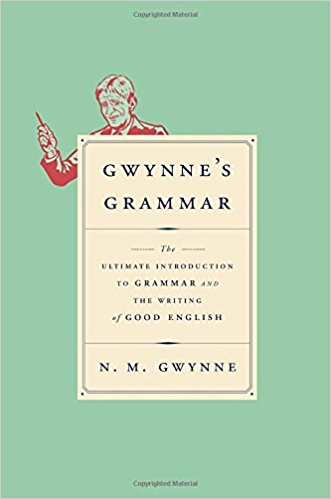“Bodily life, which we receive without any action on our own part, carries within itself the right to its own preservation. This is not a right that we have justly or unjustly appropriated to ourselves, but it is in the strictest sense an “innate” right, one which we have passively received and which preexists our will, a right which rests upon the nature of things as they are. Since it is God’s will that there should be a human life on earth only in the form of bodily life, it follows that it is for the sake of the whole man that the body possesses the right to be preserved.…
-
-
Grammar and Normativity
In Chapter 2 of Gwynne’s Grammar, Nevile Gwynne claims that happiness is partly dependent upon good grammar: “If we don’t use words rightly, we shall not think rightly” “If we do not think rightly, we cannot reliably decide rightly, because good decisions depend on accurate thinking” “If we do not decide rightly, we shall make a mess of our lives and also of other people’s lives to the extent that we have an influence on other people” “If we make a mess of our lives, we shall make ourselves and other people unhappy” Therefore, “Happiness depends at least partly on good grammar” Premise (1) suggests that good grammar is the…
-
Why Charlie Should Have Been Permitted a Shot at Life: A Reply to Ian Kennedy
Ian Kennedy argues that we are wrong to criticize the court’s decision to prevent the parents of Charlie Gard to travel to America to seek treatment not available in the UK. He cites a case in which parents of a sick child in Aukland, New Zealand had declined treatment for their sick child. The court stepped and ordered that the child be deemed a ward of the court and was treated. The child lived. Kennedy uses this case to argue that sometimes it is right for a court to step in a rule against the wishes of parents. Here is his argument: These are the steps. The first is to…
-
What’s Wrong With Mind-Reading Arguments
Consider Fred. Fred hates cars. But Fred hates cars in 1946. We don’t know why he hates cars and perhaps he might like modern cars. We can speculate all we like, but we can’t say for sure that Fred would like modern cars. We can’t say, “Well, when Fred hated cars in 1946, cars were very different. Fred didn’t even know about modern cars. Therefore, Fred would not hate cars in 2017.” The reason we can’t make the conclusion is because no kind of car was specified as the subject of Fred’s scorn. Indeed, it is highly likely that Fred hated all species of cars not because he hated every…
-
Psalm 73: Why No One Will Ever ‘Get Away With It’
From the fall of 1997 to the following summer, I lived in a YMCA in London (the one in the picture). My band and I were given residency in part to help influence other residents. This YMCA was packed full of people struggling with life. My next door neighbor was a drug addict and an anorexic – she could only walk down the hall by leaning against the wall. Many of the residents struggled with mental health issues. One man believed that he was the actor who played Darth Vader in Star Wars. He had forged an entire collection of letters and pictures to prove it! While many we lived…
-
How to Use ‘That’ and ‘Which’
Today, my family were discussing the difference between which and that. I looked it up in Strictly English by Simon Heffer. We found it very helpful. This is what he says: Perhaps the most common mistake of all with pronominal usages is the misuse of which and that as relative pronouns. It is probably not an exaggeration to say that almost everyone believes they are in most contexts interchangeable. They are not. The two sentences “the dog that was run over belonged to Mrs Smith” and “the dog, which was run over, belonged to Mrs Smith” say different things in two quite different ways. The first suggests that there were…
-
Defending Penal Substitution: A Reply to Abbot Tryphon
Abbot Tryphon argues that the penal substitutionary theory of the atonement is heresy. Tryphon calls the view “pagan” view in which “we are forced to view our God as some sort of angry deity needing to be appeased by a blood sacrifice.” Tryphon’s main argument is that if we accept the penal substitutionary view, then we are forced to accept two consequences, both of which are false: “The major problem with this teaching can be seen in the fact that had Christ died for our sins against God the Father, thus causing a division of God, with the doctrine of the Holy Trinity laid waste, with God pitted against God.…
-
What is ‘Fake News’? Clearing Up an Ambiguity
What exactly do we mean by ‘fake news’? There are two definitions being used at the moment and I think knowing what they are will clear up some confusion, a confusion that leads to unnecessary arguments. According to some, ‘fake news’ refers to a claim that turns out to be false. The term ‘news’ is taken to be synonymous with assertions about the world. If I told you that I am 5 feet tall and live in Bermuda, I would be saying something false, the ‘news’ of my height and location would be ‘fake’. On this view, anyone can be guilty of fake news. Those who hold this view can…

